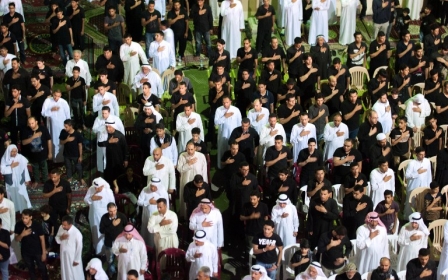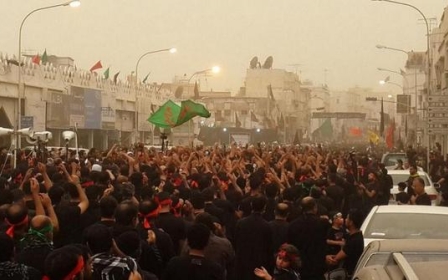Sunnis, Shiites unite in Saudi Arabia at huge funeral for victims of 'sectarian' attack

“Sunnis and Shiites, we are brothers!” was the chant in Saudi Arabia’s Eastern Province on Friday, as hundreds of thousands of people attended a funeral for the victims of an attack earlier this week on a Shiite meeting hall in the village of al-Dalwa.
Mourners cautioned, however, that despite there being a “silent majority” against sectarianism, a vocal minority of powerful ultra-conservative Wahhabi clerics were spreading hatred in the Gulf state, propped up by a government they alleged were uninterested in addressing the issue.
Seven people – including three children – were killed on Monday night when masked gunmen fired on a crowd of people commemorating Ashura, one of Shiite Islam’s holiest occasions. An eighth person was killed by the assailants - one of which had recently returned from fighting in Iraq and Syria - as they robbed his car to use in the attack, which authorities have blamed on supporters of al-Qaeda.
Saudi authorities responded with a huge security operation, arresting 15 people in six cities across the country. Two security personnel were killed during a raid in the central Qassim province and three suspects were shot dead in running gun battles.
There has been an outpouring of grief at the unprecedented attack and on Friday mourners came from across the country in what funeral goers described as “an extraordinary demonstration of national unity.”
“We showed the whole world we are united and strong,” said Mohammed Mahroos, a local of the Eastern Province who attended the funeral. “The people who did this attack want to burn our country but we will not allow that to happen.”
“They cannot break us, Sunnis and Shiites stand together.”
An estimated 200,000 people attended the funeral, where mourners carried photos of those killed – including the Sunni police officers.
Mourners told MEE the crowds descended on the small al-Dalwa village from all directions.
“They came from everywhere for the funeral – people travelled from Mecca, Riyadh, Jeddah and the north to attend,” said Hussain Muwail, a Qatif local who travelled two hours by bus to the funeral. “There were people as far as the eye could see – we stood together, Shiites and Sunnis, not just to bury the martyrs but against the terrorists and their sectarianism.”
“The hundreds of thousands who were in Ahsa today are the silent majority – those who spread sectarianism are in the minority but control the country with key positions in the government and media.”
After the attack activists who spoke to MEE accused ultra-conservative Wahhabi clerics of spreading hatred of Shiites in Saudi Arabia, which they said had led to the deadly attack in al-Dalwa, and criticised the government for having not criminalised hate speech in the kingdom.
Saudi leaders, however, have been quick to condemn the attacks.
Interior Minister Mohammed bin Nayef on Wednesday visited families of the murdered civilians and the Grand Mufti Sheikh Abdul Aziz al-Sheikh said such crimes “are against the teachings of Islam and create chaos among the Ummah [the global Islamic community]” according to the official Saudi Press Agency.
While Shiite community leaders praised the police response as “quick and transparent” some were quick to point out the lack of redress for victims of prejudice in Saudi Arabia, where they said race and sectarian hatred is widespread.
“Unfortunately we see many kinds of hatred in the public domain about black people, Shiites, non-Muslims including Hindus, Christians and Jewish people,” said Tawfiq al-Seif, a prominent leader from the Eastern Province.
“There is no legal basis to take these things to the court – if you go to a judge and say you are a Shiite and being attacked by a newspaper or speaker in the mosque they will tell you there is no legal basis to proceed with a case.”
Human Rights Watch accused Saudi authorities on Thursday of “systematically discriminating” against the Shiite community – who make up between 10 and 15 percent of Saudi Arabia’s 28 million population - in public education, the justice system and employment opportunities.
“The government’s pervasive pattern of outright discrimination and mistreatment feeds dangerous sectarian ideologies and signals that the state considers Shiites to be outside the fabric of Saudi society,” Adam Coogle, Middle East researcher at Human Rights Watch said.
“If Saudi officials really want justice for the victims of this week’s murderous rampage, they should take steps to end the long-term, systematic discriminatory practices that render Shiites second-class Saudi citizens.”
The government has repeatedly denied they discriminate against Saudi Arabia’s Shiite community.
Community leader al-Seif told MEE he has repeatedly approached the government since 2001 with a strategy to improve the situation but said “until now we haven’t seen any positive response” from Riyadh.
“I tried again and again to raise this issue in the public domain – through the Shura Council and other institutions but it seems the officials either do not like the idea or are afraid the Salafi scholars will not accept such reforms,” he said. “We need to address the hatred being spread and maintained through public education and services as well as the media.”
“Everyone knows the Salafi scholars are the main source of hatred in the country against Shiites, Christians, Westerners and women as well.”
Immediately after the attack Minister of Culture and Information Abdulaziz bin Mohiuddin Khoja took to Twitter and said he had ordered the Wesal television channel – accused of sectarian broadcasts – to be shut down.
King Abdullah sacked Khoja from his ministerial post the next day without saying why and as of Friday afternoon Wesal, which has offices in Cairo as well as Riyadh, was still on air.
Qatif resident Muwail, who attended Friday’s funeral, said the security operation, visits to victims’ families and ministerial public statements had all come because of the widespread coverage given to the killings in al-Dawla.
“The media have focused on this attack and the government can’t stop it,” he said.
“Social media also helps a lot, as the government can’t control information anymore – the situation isn’t in their hands as it has been in the past.”
Stay informed with MEE's newsletters
Sign up to get the latest alerts, insights and analysis, starting with Turkey Unpacked
Middle East Eye delivers independent and unrivalled coverage and analysis of the Middle East, North Africa and beyond. To learn more about republishing this content and the associated fees, please fill out this form. More about MEE can be found here.




